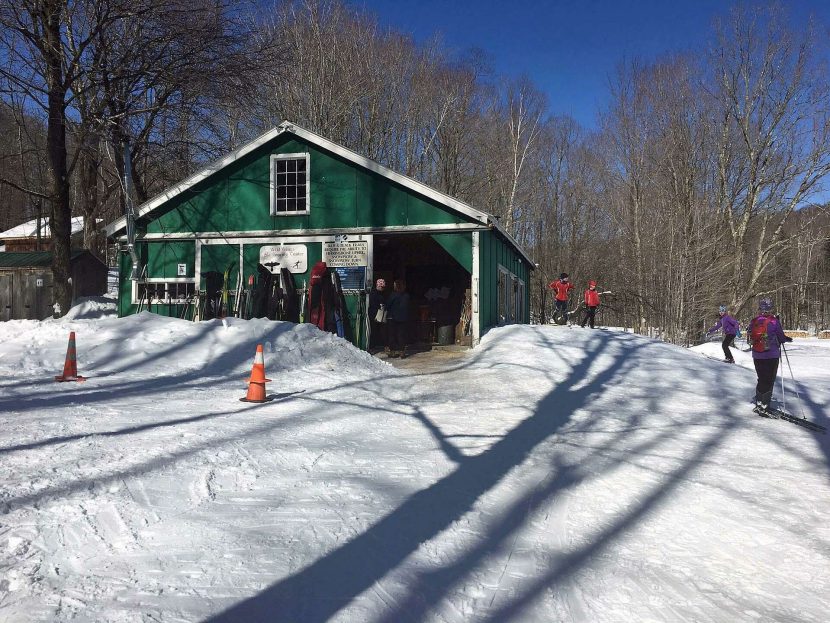CONCORD, N.H. — They could take the easy way up, relaxing on the lift before gliding effortlessly down the ski slopes, carving smooth “s” turns in the snow, propelled by the helpful force of gravity. But instead, some skiers at Cranmore Mountain Resort in North Conway are relishing an old-school challenge: “earning their turns” by […]

CONCORD, N.H. — They could take the easy way up, relaxing on the lift before gliding effortlessly down the ski slopes, carving smooth “s” turns in the snow, propelled by the helpful force of gravity.
But instead, some skiers at Cranmore Mountain Resort in North Conway are relishing an old-school challenge: “earning their turns” by getting up the hill under their own power.
Ski touring has long been a niche community in snow sports, where skiers use special bindings and climbing skins to access backcountry locations for a purer, less-commercial experience in conditions dictated by nature, not machines. But, while backcountry skiing has exploded in popularity in recent years, warmer weather driven by climate change has led to steep declines in snow cover around New England, making for sketchy if not outright unskiable conditions out in the wild.
And that’s pushed more ski tourers back to the busy resorts some once spurned, where manmade snow and more-consistent skiing conditions promise a surer payoff for all their hard work.
“They like the fact that there’s ski patrol there. They like the fact that the trails are groomed. They like the fact that there’s consistent snow,” said Benjamin Wilcox, the president and general manager at Cranmore Mountain Resort.
“I’ll never forget the first time I tried it,” Wilcox said. “You went about 100 feet up the mountain, you’re like sweating, going ‘Oh, my god, this is so hard!’ But after you do it several times, it’s kind of like you get used to it. You know what tempo to go up and it becomes a fun thing.”
The COVID pandemic help boost the popularity of has grown in recent years, with a spike in interest during the pandemic as a socially distanced way to be outside. There were about 100,000 people in New England who did some form of uphill skiing in the 2023-2024 winter season, according to an industry report from Snowsports Industries America.
After initially being cool to ski tourers, the resort industry has slowly embraced the trend, even making a business out of it: Many now charge uphill skiers to access their mountains. Cranmore, for example, is one of 19 ski resorts in New England participating in a multi-mountain season pass through Uphill New England, an organization created by Ed Warren in 2023 in an effort to increase access to the sport.
“There was a lot of, in my opinion, unnecessary angst associated with uphilling and ski resorts,” Warren said. Some resorts were skeptical about uphill skiers and, he acknowledged, some uphill skiers acted entitled, skiing at resorts whenever they pleased without purchasing a pass.
“We saw a risk of losing access to the ski resorts,” Warren said. They hope to avoid that by collaborating with resorts to standardize rules and expectations for uphill skiers.

The Uphill New England pass has become more popular, growing from 13 resorts in New England in 2023 to 19 in 2024, and now includes Waterville Valley Resort Tenney Mountain in Plymouth, Dartmouth Skiway, and Whaleback Mountain in New Hampshire, and Killington in Vermont. And at least 10 other resorts around the state currently allow uphill travel, according to Ski New Hampshire.
“I think there was a question among ski resorts about whether or not this uphilling thing was a fad or whether it would stick around,” Warren said. “I think people are pretty convinced it’s sticking around now.”
In 2021, Zach McCarthy, 27, created a nonprofit, Inclusive Ski Touring, to teach newcomers and make the sport more accessible.
At first, McCarthy, an avid uphill skier, was just posting on social media to organize informal ski meet-ups.
“I started to get bombarded by a ton of messages and questions,” McCarthy said. Creating a nonprofit opened the door to fundraising and sponsorships to defray the high costs that could otherwise prevent people from participating.
Inclusive Ski Touring now offers group programs at resorts and in the backcountry. It’s $20 to join a group session at a resort, and free to those who can’t afford the fee.
The goal is to lower the barriers to entry, such as the cost and specialized knowledge, and to get people from underrepresented backgrounds outside. They offer specific programs for women, queer people, and people of color.
“Each year, we’ve continued to see more and more interest and demand for our programs,” McCarthy said. It’s grown from 220 participants in 2021 to 750 participants in the 2023-2024 winter season, according to McCarthy.
Technological advances have made uphill ski equipment lighter and more reliable, one factor aiding its new-found popularity, according to Paul “Coz” Teplitz, executive director at the Granite Backcountry Alliance, which works with landowners to expand public access to backcountry skiing by creating more skiable terrain.
Uphill skiers attach special climbing skins to the bottom of their skis that allow them to slide forward and grip the snow to prevent sliding backward. They remove the skins once they reach the top of the mountain, and glide back down. Special bindings allow skiers to lift their heels while traveling uphill, and then lock them into place to ski down the mountain.
“Essentially, it’s like going for a nice hike in the woods, and then the trip down is, in my opinion, a little more fun than hiking down,” said Teplitz.
While the specialized gear can be a costly investment, an uphill day pass at a resort is significantly less than a lift ticket. A day pass for the lift at Bretton Woods cost up to $155, while an uphill pass is $25. The season-long multi-mountain 2024-2025 from Uphill New England costs $215 for adults. A weekend day pass to downhill ski at Cranmore, in comparison, costs $119 per day for people age 13 to 65.
The interest in uphilling can be an opportunity for resorts to draw in new visitors, but it can also be a liability. Wilcox said he was wary at first about attracting more uphill skiers and the potential for conflict with the downhillers, but he came to view it as an additional offering.
The mountain has introduced new rules to manage the extra traffic, Wilcox said, such as set routes for uphill travel. He estimates about 5 percent of skiers participate in uphill skiing.
“On a big Saturday, you may see 100 or 200 people going up, which sounds like a lot of people,” said Wilcox, though it remains a relatively small proportion of the 2,000 to 3,000 people downhill skiing on a given day.
Teplitz said the latest developments in skiing also represent a return to its origins. He said many of the backcountry trails people frequent in New Hampshire and elsewhere in New England were cut in the 1930s by the Civilian Conservation Corps and would’ve been accessed in a similar way to uphill skiing. The same is true for early skiers in Europe, who either hiked or used animal skins to ascend the mountains.
“This is a way that people have for decades found fulfilling engagement outside,” Teplitz said. “And I’m so excited that we are, as a ski culture, coming back to that in some sense.”
Amanda Gokee can be reached at amanda.gokee@globe.com. Follow her @amanda_gokee.














